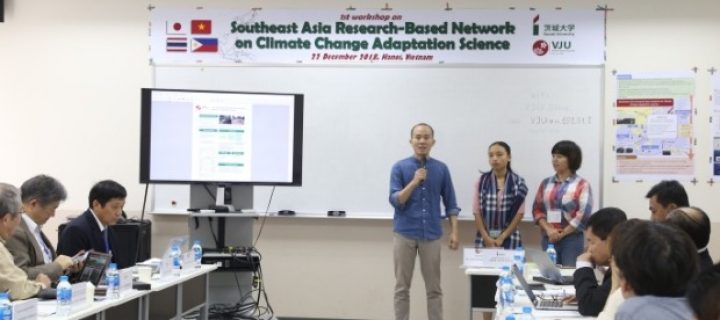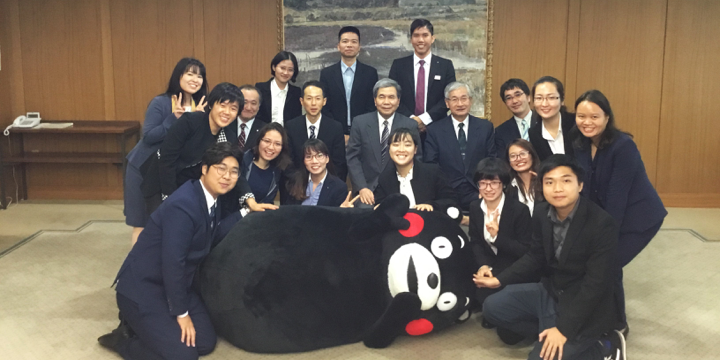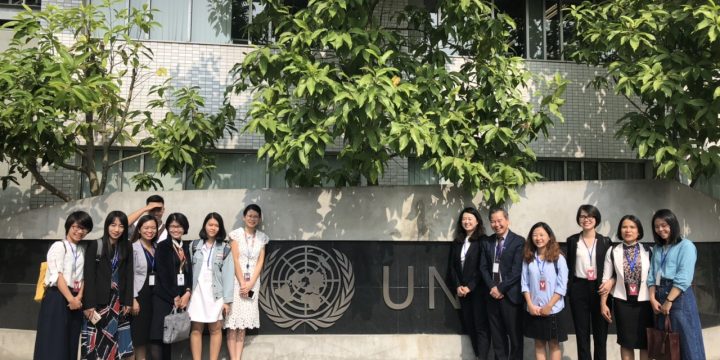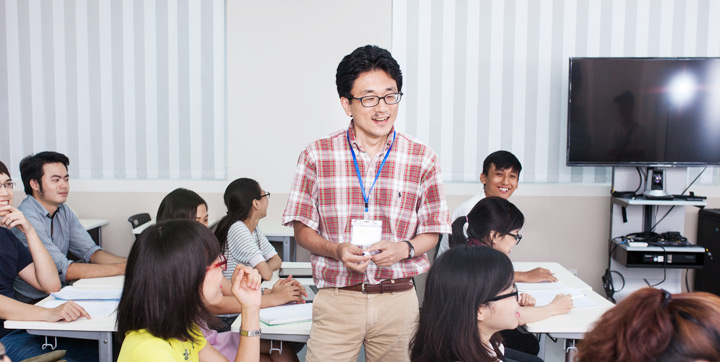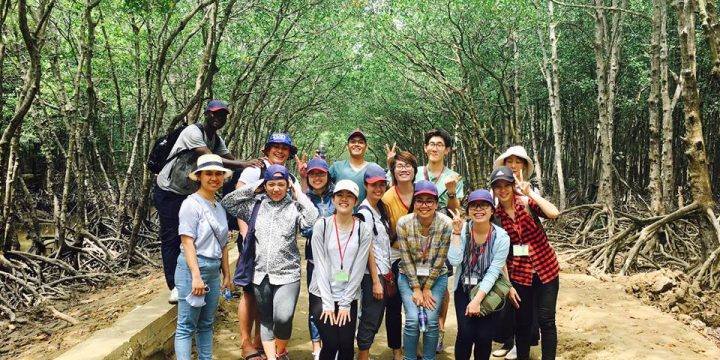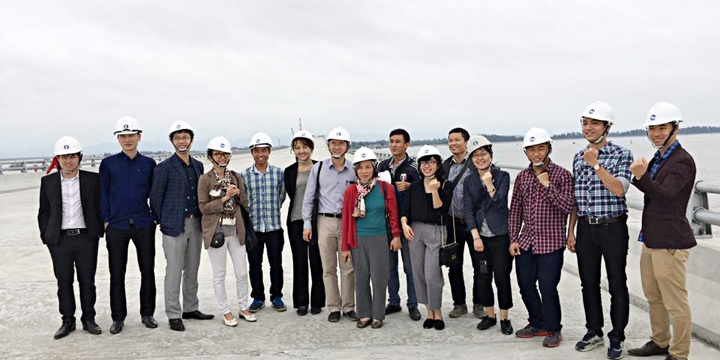VJU Admissions 2023
Online and onsite interview and documents screening
Direct methods for VNU undergraduate students from specific programs!
Open ceremony in September!
More chance to study and work
in the international scientific environment!
REGISTER
VIETNAM JAPAN UNIVERSITY - VIETNAM NATIONAL UNIVERSITY HANOI
offers Vietnamese and international graduate students opportunities to study and experience in standardized academic environment inherited from Japanese style with prestigious professors from Vietnam and Japan, multicultural environment for academic activities, open seminars, field trip, tutoring, Japanese and soft-skill courses, internship in Japanese, library and laboratories.
In 2023, VJU accepts directly students graduating with Credit or upper Grade from the some majors which is the same or close to the applied programs. Please see the direct methods section below for more details.
For both methods of accepting new students (direct or documents screening and interview), the schedule is as follows:
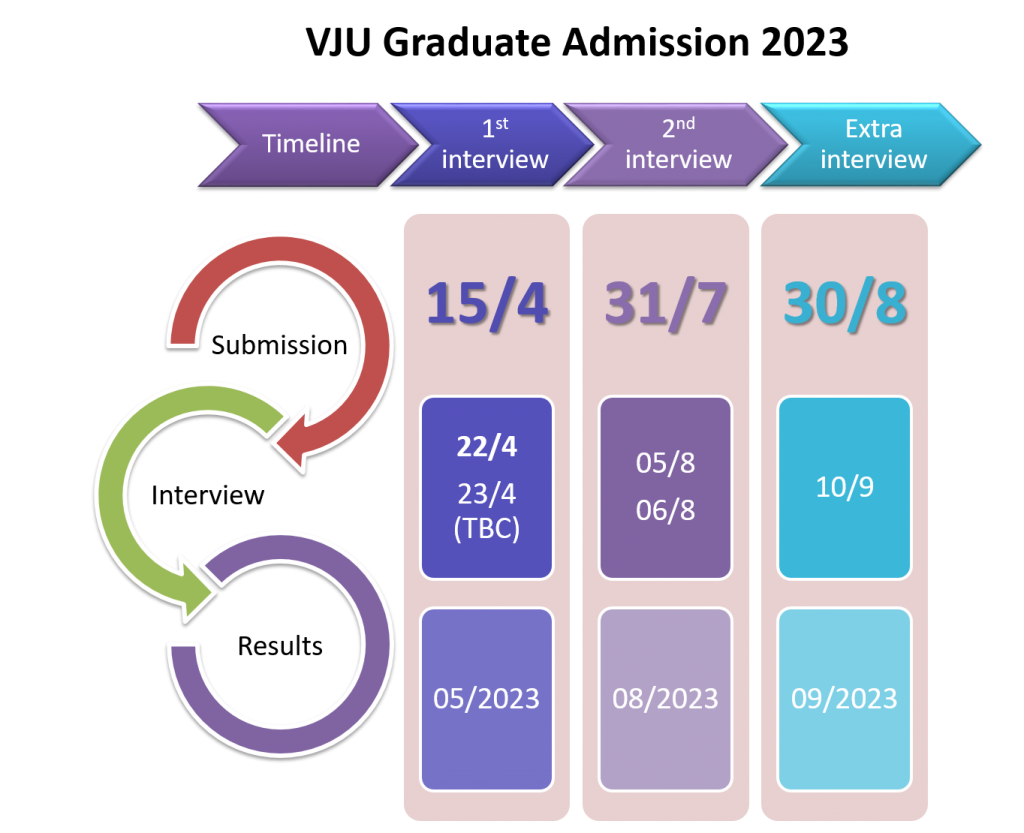
MASTER'S PROGRAMS
In 2023, Vietnam Japan University – Vietnam National University Hanoi offers 8 master’s programs
WHY
1 International and Innovative Environment
- Top notch high-quality programs based on the curricula of Japanese leading universities.
- Studying and working in an international academic environment.
- Interdisciplinary and multiple disciplinary innovative thinking with an aim for sustainable development and excellent skills for international integration.
- A thorough understanding of Japanese and corporate governance and culture.
- Most programs are designed with flexible schedule, suitable for students who are in work.
2 Scholarships & Financial aids
- 70% training cost of students will be subsidized by Japanese and Vietnamese Governments.
- 10 full scholarships from Japan-ASEAN Integration Funds for students from Laos, Myanmar, Cambodia.
- 35 full scholarships Japan-ASEAN Integration Funds for Vietnamese students.
- More than 10 full or half tuition fee subsidy scholarships from Japanese enterprises, organizations and individuals
- About 50 Internship scholarships with duration from 2 weeks -1 month in Japan and Vietnam.
3 Partnership with leading universities in Japan
- Osaka University
- University of Tsukuba
- The University of Tokyo
- Yokohama National University
- Ritsumeikan University
- Waseda University
- Ibaraki University

Prof. Furuta Motoo
Rector
“We call for the youth who possess high motivation and ambitious dreams to join VJU and together build an outstanding university in Vietnam, as a standard model for both Vietnam and Japan”.
SUBMISSION
Via post mail/Direct (Hard copies): Admission office, R.510, Luu Huu Phuoc street, Cau Dien ward, Nam Tu Liem district, Hanoi, Vietnam.
Via email (Soft copies): Send to admission@vju.ac.vn
ELIGIBILITY REQUIREMENTS
No. | Program | Code | Same majors | Appropriate majors | Relevant related majors |
1 | Public policy | 8340402.01 | Economics | Development economics, International economics and other majors with 90% of the courses/credits matched with those of the economics program. | International Studies, Scientific socialism, Accounting, Auditing, Journalism, Sociology, Social work, Oriental studies, Education Political Economy, Public Management, International Business, Marketing, Commercial Business, Regional and Urban Planning, Human Resource Management, Agricultural Economy, Tourism and Travel Service Administration, Hotel Administration, State management, Science of political management, International relations, Business administration, Finance – banking, Law and other majors with more than 60% of the courses/credits matched with those of the economics program. |
Applicants are required to have GPA≥ 2.5/4.0. | |||||
2 | Nanotechnology | 8440140.11 QTD | Applicants graduated in Natural Sciences, Technical Technologies, Medicine, Pharmacology and Agriculture will be considered by the Admission committee based on the application documents. | ||
Applicants are required to have GPA≥ 2.5/4.0. | |||||
3 | Civil Engineering (formerly, Infrastructure Engineering) | 8900201.04 QTD |
| Transportation engineering, Civil engineering, Hydraulic works engineering, Marine works engineering, Infrastructure engineering, Engineering mechanics, Civil works engineering, Civil engineering technology, Transportation engineering technology, Construction materials engineering technology, Geotechnical engineering/construction geotechnics, Water resource engineering | Construction management, Architecture, Geological engineering, Construction economics, Landscape architecture, Environmental engineering, Regional and urban planning |
Applicants are required to have + GPA≥ 2.5/4.0. + Or GPA < 2.5/4.0 with a minimum of 02 years work experience. | |||||
4 | Environmental Engineering | 8520320.01 | Environmental technology engineering | Chemical engineering technology, Environmental engineering, Environmental science, Water resource engineering. | Chemical Engineering, Pharmaceutical Chemistry, education, chemistry, Management, environment and natural resources, soil science, pedagogy, biology, biology, engineering, geology, Agricultural engineering fisheries, food technology, the industry belongs to the group of biology application (code 74202), technical water supply, drainage, biotechnology, Pharmacy, medicine, technology, engineering constructions. |
Applicants are required to have GPA≥ 2.5/4.0. One year of work experience is required for applicants graduated in the same or appropriate majors with GPA < 2.5/4.0. Two years of work experience is required for applicants graduated in relevant majors with GPA < 2.5/4.0. | |||||
5 | Business Administration | 8340101.01 | Business administration | Marketing | Majors belonging to MOET’s groups of IV-level on training and education; Majors have interdisciplinary; Applicants graduated from university in foreign countries which are not included in the list of training programs regulated by MOET, have two years working experience in Business Administration field and have two consecutive years on management position will be considered by Admission Committee |
Applicants must have GPA ≥ 2.8/4.0 Two years of work experience is required for applicants with GPA from 2.5/4.0 to less than 2.8/4.0. 10 years of work experience is required for applicants with GPA <2.5/4.0. | |||||
6 | Climate change and Development | 8900201.02 QTD | – Majors in Natural sciences; Social sciences and Behavioral Sciences; Majors in Business and management; and Other related disciplinary sciences; – Applicants graduated in foreign countries which are not included in the list of training programs regulated by Ministry of Education and Training will be decided by Admission Committee based on the application documents. | ||
Applicants are required to have GPA≥ 2.5/4.0. Applicants who have GPA ≥ 2.0 but smaller than 2.5/4.0 should have at least 2 years of experience | |||||
7 | Area Studies | 8310604.01 QTD | – Holders of a bachelor’s degree in majors under Humanities majors category (code # 722) and Social and behavioral sciences (majors’ category (code # 731); – Holders of a bachelor’s degree in majors of Natural sciences with high multi-disciplinary shall be considered by the Admission committee based on the application documents; – Holders of a bachelor’s degree in majors from abroad, which do not match any majors in the list of training majors by the Ministry of Education and Training, shall be considered by the Admission committee based on the application documents. | ||
Applicants are required to have GPA≥ 2.5/4.0. | |||||
8 | Global Leadership | 8310210.01 QTD |
| Philosophy, Scientific socialism, Politics, Construction of the Party and the State, State Management, International Relations, International Studies, Asian Studies, Pacific Studies, Eastern Studies, Chinese Studies, Japanese Studies, Korean Studies, Southeast Asian Studies, Vietnamese studies, Management Science, Law, Economic law, Economics, Political Economics, Development Economics, International Economics | Sociology, Anthropology, Psychology, Religious Studies, History, Social Work, Tourism, Information Technology, Public Management, Human Resources Management, Project Management, Business Administration, Political Economics, Archive studies, Information Management, Cultural Studies, Cultural management, Linguistics, Literature, English language, Russian language, French language, Chinese language, German language, Educational Management, Industrial Management, Industrial Economics, Resource and Environmental management, Natural Resources Economics, Journalism Multimedia Communication, Mass Communication, Communication Technology, International Communication, Public Relations Special cases are specifically considered by the Admissions Council and submitted to the Rector of VJU for consideration and decision |
|
|
| Applicants are required to have GPA≥ 2.5/4.0. | ||
English requirement for each Master’s Program
At the date of submission, the applicant must possess an English language proficiency that meets one of the following requirements:
a) Holding a valid English certificate within 2 years from the exam date to the date of submission and was issued by an institution recognized by VNU. For those 27 instututes issues Vietnamese 6-level of foreign language ability framework, please refer for the validity in appendix 2.
The English certificate must be at least level 4/6 (B2) or equivalent.
b) Holding a bachelor’s degree or a master’s degree, or a Ph.D. degree of an English-medium full-time study program in a country where English is used as the official language. The degree must be recognized by relevant agencies in accordance with current regulations.
c) Holding a bachelor’s degree of an advanced training program under MoET’s Project on advanced training in some Vietnamese universities; Graduated from talented, international, advanced, honor bachelor’s program or master’s program which have foreign language expected learning outcome equivalent to the level 4/6 onward of Vietnamese 6-level of foreign language ability framework within 2 years to the date of admission (expiry date does not apply to VNU’s degree).
d) Holding a bachelor’s degree major in English language.
Language requirements of Master’s program in Area Studies (MAS).
In addition to the English language requirement as in section 2.1, MAS program require proficiency in Vietnamese and Japanese. Specific requirement as follows:
*For applicants applied for Japanese studies orientation
The applicant must meet one of the following requirements in Japanese language proficiency:
a) Holding a Japanese language certificate issued by an institution recognized by VNU equivelant to N2 level or higher (Appendix 2) and must be within 2 years from the exam date to the date of submission.
b) Holding a bachelor’s or master’s or Ph.D.’s degree from a full-time Japanese-medium program.
c) Holding a bachelor’s degree major in Japanese language.
*For foreign applicants applied for Vietnamese studies orientation
a) Holding a Vietnamese language certificate level 4/6 of the Vietnamese language ability framework for foreigners issued by VNU University of Social Sciences and Humanities or an equivalent certificate issued by an institution licensed by the Ministry of Education and Training.
b) Holding a bachelor’s or master’s or Ph.D.’s degree from a full-time Vietnamese-medium program.
c) Holding a bachelor’s degree major in Vietnamese language.
d) Holding a certificate of completion of the preparatory Vietnamese course offered by VNU University of Social Sciences and Humanities or by an institution licensed by the Ministry of Education and Training.
Note on language requirement
In case the candidate (foreigners) may not present the proof of English/Japanese/Vietnamese language proficiency as required in the admission notice, the Judge subcommittee (including Japanese and Vietnamese professors, lecturer) will evaluate the language skill (English or Japanese) of candidate based on the application documents and the interview process. Applicant must submit a language proficiency certificate to be recognized as an official student of the university.
Candidates are required to have proof of language proficiency equivalent to the level 4/6 (B2) at the time of application submission. If foreign language certificate is not available at the time of application, candidate must commit to submit a foreign language certificate before VJU can announce the students pass the interview.
Mapping table of English certificates and list of recognized English certificate and issuing institutions for VNU graduate admission
Vietnamese foreign language ability framework | IELTS | TOEFL | Cambridge Exam | Vietnamese Standardized Test of English Proficiency |
| Level 3 | 4.5 | 42 iBT | A2 Key 140 B1 Preliminary: 140 B2 First 140 B1 Business Preliminary 140 B2 Business Vantage 140 | VSTEP.3-5 (4.0)
|
| Level 4 | 5.5 | 72 iBT | B1 Preliminary: 160 B2 First 160 B1 Business Preliminary 160 B2 Business Vantage 160 C1 Business Higher: 160 | VSTEP.3-5 (6.0) |
Issuing institutions of level 3 and 4 of English certificate (*)
1. University of Languages and International Studies (VNU-ULIS)
2. Hanoi University (HANU)
3. Hue University College of Foreign Languages – Hue University
4. University of Education Ho Chi Minh City
5. University of Foreign Language Studies, University of Da Nang
6. Hanoi National University of Education
7. Hanoi University of Science and Technology
8. University of Social Sciences and Humanities, Viet Nam National University Ho Chi Minh City
9. Thai Nguyen University
10. Can Tho University
11. Nam Can Tho University
12. Vinh University
13. People’s Security Academy
14. Academy of Journalism and Communication
15. Thuongmai University
16. Foreign Trade University
17. Military Technical Academy
18. People’s Police Academy
19. Quy Nhon University
20. Tay Nguyen University
21. Sai Gon University
22. Van Lang University
23. Tra Vinh University
24. Ho Chi Minh University of Banking
25. Industrial University of Ho Chi Minh City
26.Ho Chi Minh City University of Food Industry
27.Ho Chi Minh City University of Economics and Finance
(*) English certificate sample must comply with the regulations of Ministry of Education and Training attached to the Announcement No. 691/TB-QLCL dated 08 May 2020.
| No. | Issuing institutions International English certificate | Recognized for VNU graduate admission | |||||
| IELTS | TOEFL | Cambridge Exam | |||||
| 1 | Educational Testing Service (ETS) | √ | |||||
| 2 | British Council (BC) | √ | |||||
| 3 | International Development Program (IDP) | √ | |||||
| 4 | Cambridge ESOL | √ | √ | ||||
List of Japanese certificate issuing institutions recognized for VNU graduate admission
| No. | Japanese education institutions | Certificate | Result | Recognized for VNU graduate admission |
| 1 | The Japan Foundation | JLPT | N2 (90) | √ |
| 2 | Senmon Kyouiku Publishing Co., Ltd. | NAT-TEST | 2Q (100) | √ |
| 3 | Nihongo Kentei Kyokai | J – Test | 600 | √ |
No. | Numerical score | Letter score | Numerical score |
1 | From 9.0 to 10 | A+ | 4.0 |
2 | From 8.5 to 8.9 | A | 3.7 |
3 | From 8.0 to 8.4 | B+ | 3.5 |
4 | From 7.0 to 7.9 | B | 3.0 |
5 | From 6.5 to 6.9 | C+ | 2.5 |
6 | From 5.5 to 6.4 | C | 2.0 |
7 | From 5.0 to 5.4 | D+ | 1.5 |
8 | From 4.0 to 4.9 | D | 1.0 |
9 | Below 4.0 | F | 0 |
Graduation ranks | Grade Point Average (GPA) |
Outstanding | 3.60 – 4.00 |
Excellent | 3.20 – 3.59 |
Good | 2.50 – 3.19 |
Average | 2.00 – 2.49 |
GPA conversion table for students graduate from foreign institutions.
110 pt scale | 100 pt scale | 20 pt scale | 10 pt scale | 7 pt scale | 5 pt scale | 4 pt scale |
77-79 | 65 | 13.00 | 6.50 | 3.75 | 3.50 | 2.50-2.59 |
80-81 | 66 | 13.20 | 6.60 | 3.80 | 3.60 | 2.60-2.69 |
82-83 | 67 | 13.40 | 6.70 | 3.85 | 3.70 | 2.70-2.79 |
84-85 | 68 | 13.60 | 6.80 | 3.90 | 3.80 | 2.80-2.89 |
86-87 | 69 | 13.80 | 6.90 | 3.95 | 3.90 | 2.90-2.99 |
89 | 70 | 14.00 | 7.00 | 4.00 | 4.00 | 3.00-3.09 |
90 | 71 | 14.20 | 7.10 | 4.20 | ||
91 | 72 | 14.40 | 7.20 | 4.40 | 4.05 | 3.10-3.19 |
92 | 73 | 14.60 | 7.30 | 4.60 | ||
93 | 74 | 14.80 | 7.40 | 4.80 | 4.10 | 3.20-3.29 |
94 | 75 | 15.00 | 7.50 | 5.00 | ||
95 | 76 | 15.20 | 7.60 | 5.20 | 4.15 | 3.30-3.39 |
96 | 77 | 15.40 | 7.70 | 5.40 | ||
97 | 78 | 15.60 | 7.80 | 5.60 | 4.20 | 3.40-3.49 |
98 | 79 | 15.80 | 7.90 | 5.80 | ||
99 | 80 | 16.00 | 8.00 | 6.00 | 4.25 | 3.50-3.54 |
81 | 16.20 | 8.10 | 6.05 | |||
100 | 82 | 16.40 | 8.20 | 6.10 | 4.30 | 3.55-3.59 |
101 | 83 | 16.60 | 8.30 | 6.15 | ||
102 | 84 | 16.80 | 8.40 | 6.20 | 4.35 | 3.60-3.64 |
85 | 17.00 | 8.50 | 6.25 | |||
103 | 86 | 17.20 | 8.60 | 6.30 | 4.40 | 3.65-3.69 |
87 | 17.40 | 8.70 | 6.35 | |||
104 | 88 | 17.60 | 8.80 | 6.40 | 4.45 | 3.70-3.74 |
89 | 17.80 | 8.90 | 6.45 | |||
105 | 90 | 18.00 | 9.00 | 6.50 | 4.50 | 3.75-3.79 |
91 | 18.20 | 9.10 | 6.55 | 4.55 | ||
106 | 92 | 18.40 | 9.20 | 6.60 | 4.60 | 3.80-3.84 |
93 | 18.60 | 9.30 | 6.65 | 4.65 | ||
107 | 94 | 18.80 | 9.40 | 6.70 | 4.70 | 3.85-3.89 |
95 | 19.00 | 9.50 | 6.75 | 4.75 | ||
108 | 96 | 19.20 | 9.60 | 6.80 | 4.80 | 3.90-3.94 |
97 | 19.40 | 9.70 | 6.85 | 4.85 | ||
109 | 98 | 19.60 | 9.80 | 6.90 | 4.90 | 3.95-3.99 |
99 | 19.80 | 9.90 | 6.95 | 4.95 | ||
110 | 100 | 20.00 | 10.00 | 7.00 | 5.00 | 4.00 |
- Graduated within 12 months (up to the time of application submission) with the Credit grade of graduation or higher of the same major from the full-time study mode of the undergraduate programs in VNU (see the below table);
- Graduated within 12 months (up to the time of application submission) with the Distinction grade of graduation or higher of the same major from the full-time study mode of the high-quality, standard training programs according to Circular 23/2014/TT-BGDĐT by VNU;
- Graduated within 12 months (up to the time of application submission) with the Distinction grade of graduation or higher of the appropriate major from the full-time study mode of the undergraduate programs in VNU (see the below table);
- Bonus points for students with scientific prize at VNU or MOET level: First prize: 0.2 points, Second prize: 0.15 points, Third prize 0.1 points, the consolation prize: 0.07 points.
- Bonus points for students with scientific prize at university or faculty level: First prize: 0.1 points, Second prize: 0.07 points, Third place 0.05 points
| No. | Major receiving “direct offer” registration | Same major | Master’s Program Appropriate majors |
| 1 | Climate Change and Development | – Environmental science – Physical Geography – Oceanography – Meteorology – Hydrology – Geology | |
| 2 | Nanotechnology | – Materials science | – Physics – Chemistry – Biology – Chemical Technology Engineering – Biological Technology |
| 3 | Environmental Engineering | Environmental Engineering Technology | – Geology – Environmental science – Biology – Chemistry – Environmental Engineering |
| 4 | Civil Engineering | – Materials science – Mechatronics Engineering Technology | |
| 5 | Business Administration | – Business Administration | – Management Science – International Economics – Finance – Banking |
| 6 | Public Policy | – Law – Management Science – Political Science – International Studies – Journalism |
TUITION AND FEES
Application fee
500.000 VND (for documents screening and interview method)
200.000 VND (for direct method)
Enrollment fee
1,800,000 VND
(only after getting the offer)
Tuition fee
92,000,000 VND (Vietnamese students)
110,000,000 VND (foreign students) ~ prospective international students will check the exchange rate at the time of payment for the precise amount in their currency or USD)
METHOD OF PAYMENT
Application fee payment could be made by one of the following modes:
a) Bank transfer to the following account
Bank name: | Bank for Investment and Development of Vietnam | Transfer description Follow the syntax: (Full name of the applicant) paid for the application fee for (Name of the applied master’s program according to the below acronyms) Master Program in Public Policy: MPP Master Program in Nanotechnology: MNT Master Program in Civil Engineering: MCE Master Program in Environmental Engineering: MEE Master Program in Area Studies: MAS Master Program in Business Administration: MBA Master Program in Climate Change and Development: MCCD Master Program in Global Leadership: MGL Example: Pham Chau Giang paid for the application fee for MEE |
Branch name: | My Dinh Branch | |
Account number: | 2601 0000 816336 | |
Account name: | Vietnam – Japan University | |
Currency: | VND | |
SWIFT Code: | BIDVVNVX | |
Amount to be transferred: | VND 500,000 |
b) In cash at the Planning and Finance Office during the office hours.
Note
– The admission fee does not include travel, meals and accommodation expenses during the stay for the entrance examination.
– Application fees are non-refundable in any cases
SHARING
Master’s Program in Nanotechnology
Master’s Program in Environmental Engineering
Lecturer of Master’s Program in Infrastructure Engineering
Master’s Program in Public Policy
Master’s Program in Business Administration
Master’s Program in Infrastructure Engineering
Dr. Kato Atsufumi
Lecturer of Master’s Program in Area Studies
1. What is Vietnam Japan University? Is it a Japanese university?
Vietnam Japan University (VJU) is opened in 2014 and first welcomed students in 2016 under strong supports from the governments of Japan and Vietnam, and it is one of the member universities of Vietnam’s top-level university, Vietnam National University, Hanoi.
2. Is the degree of VJU highly recognized in Japan?
Of course, the degree of VJU is highly recognized all over the world.
3. How is the academic level of VJU?
Master’s programs of VJU are developed based on cooperation with Japanese coordinating universities such as the University of Tokyo, University of Tsukuba, Osaka University, Yokohama National University, Ritsumeikan University, Ibaraki University, Waseda University. These Japanese supporting universities send many professors to teach and supervise VJU students. In collaboration and support from reputable Vietnamese and Japanese academic and industrial institutions, VJU students can enjoy cutting-edge research activities in addition to course works.
1. How much is the academic fee?
Application Fee: VND 500,000 (~21.5 USD)
Enrollment fee: 1,800,000 VND (~77 USD)
Tuition fee: 110,000,000 VND (~ 4,700 USD) for 2-year for international students enroll in 2023
Exchange rate: as of 3 March 2023
2. Is there any scholarship program?
Several merit-based and needed-based scholarship programs are available. Every year more than 70% of students benefit from the merit-based scholarships.
Students from Laos, Cambodia and Myanmar can receive the scholarships from JAIF (Japan – ASEAN Integration Fund) which cover all the tuition fees, application and enrollment fees, some stipend fees and medical insurance, return tickets)
Students from Vietnam from can benefited from JAIF also (specific programs like MAS, MCCD, MCE, MPP, MGL, MNT, MEE)
Other scholarships from individuals and enterprises such as Yamamoto, Nissaku, Sekisho, Nippon Steel, Fast Retailing, Zeon, etc.
1. In which languages are the classes and research conducted in VJU?
Common subjects, major courses and Japanese classes will be conducted in English (Advanced Japanese class will be conducted in Japanese). In addition to taking classes, master’s thesis must be written in English. However, this shall not be applied to MAS. In MAS, Vietnamese and/or Japanese languages are used in addition to English.
2. Is Vietnamese language proficiency needed?
Vietnamese language is not mandatory for study in VJU except for the program Vietnamese studies of Area Studies Program.
3. Where will be the internship program implemented?
The internship programs are set for the 3rd semester and mainly conducted in Japan and/or Vietnam. VJU prepare scholarships for internship in Japan by support of Japan International Cooperation Agency (JICA) and other companies. If necessary, VJU will consult with you individually about internships in your home country.
4. Are the facilities and equipment for students’ research and experience enough?
VJU tries to enhance the equipment, even research facilities are not good as Japanese universities especially in the science and engineering fields at present. However, on-site research in Vietnam where is facing various challenges behind the rapid economic growth will be the valuable and interesting opportunities for international students.
1. Do you accept international students in all programs?
Yes, all master’s programs in VJU accept international students.
2. Can I apply for any program? Can I apply for VJU master’s programs, WHICH is different from my bachelor’s study?
Basically, you need to have some background knowledge before entering any graduate programs. In Vietnam, most master’s programs have their own list of the appropriate majors in undergraduate program to apply for the program except for some programs with the interdisciplinary orientation. Please refer to the list in the admission announcement.
If you wish to apply for the program, which is different from your study in undergraduate, or if your major in undergraduate program is not listed, please consult with the program or admission office. In some programs, you may be required to take supplement courses at the beginning of the program.
3. Is there a special entrance examination for international students?
No. Regardless of nationality, you will take the same exam.
4. Is the entrance exam only organized in Vietnam?
Yes. However, you can take online interviews without having to travel to Vietnam.
5. Only IELTS score can be ACCEPTED. How about TOEIC, TOEFL or another test?
VJU accepts the result of international English proficiency tests other than IELTS. Please refer to the admission announcement for the acceptable English proficiency test.
6. Do I need to apply by myself? Can someone on behalf of myself apply?
Application documents must be prepared and submitted by the applicant him/herself. In case the applicant cannot manage to submit the document, he/she should inform the Admission Office to designate others to submit. However, he/she should sign themselves in all the needed documents.
1. How much is the monthly cost for living?
It depends on where you stay and how you live, but average of living cost is approx. 200 USD.
Some ideas for living costs: Light meal (Banh mi (Vietnamese sandwich bread), Pho, or rice meal): 20,000~50,000 VND (1~2 USD, Water (500 ml bottle): 5,000 VND~ (0.25 USD~), Bus (1 way): 7,000 VND (0.3 USD), 1 can of beer: 10,000 VND~ (0.5 USD~).
House renting fees varies, living in the VNU dormitory may be the good choice with price ranging from 35 USD per bed monthly (room with 6-bunked bed) upwards. Students can find some studios nearby the university with price around 130 USD per month.
2. Is there support for housing?
VJU can support international students to apply for the VNU dormitory or to find private apartments around VJU.
3. What should I do if I get injured or get sick?
There is a city hospital near VJU and Vietnamese staff can support you. Also, there are several international clinics where students can receive treatments in English or Japanese language.
4. Is there any requested insurance by VJU? When I get injured or sick in Vietnam, will the health insurance or medical insurance be covered?
International students are required to buy insurance individually. Student Affairs Office will provide you the insurance information.
5. Can international students work part-time in Vietnam? Can you introduce a part-time job?
International students with one-year study visa are able to work in Vietnam during their study time. However, some Vietnamese or International organizations operating in Vietnam may require employers to complete all procedures to apply for work permit/work permit exemption certificate in line with Vietnamese labor laws through Ministry of Labor, War Invalids and Social Affairs.
VJU tries to provide information of part-time jobs for international students upon request. However, Vietnamese language skill is required in most cases.
6. Do I need to obtain VISA by myself?
VJU will support and issue the necessary documents for immigration office. With the document and photo, application fee, student him/herself visits Vietnamese embassy in the country to apply for student Visa.
7. Is there a tutor system for international students?
VJU does not start the official system of tutor. However, upon individual requests, VJU Student Affairs Office and the Faculty assistants are the first contact and programs may ask other Vietnamese students to volunteer to support.
8. Are there any opportunities for international students to go to study abroad?
Yes, basically all VJU students can take the opportunities of student exchange programs under MOU with partner universities if partner universities do not limit the nationality of exchange students.
9. Is there specific supporter for international students?
The Student Affairs officer will support you as the first contact.
1. After the graduation from VJU, what is my career path?
VJU has been receiving great attention especially from Japanese companies in Vietnam and ASEAN countries. So, the international students who have knowledge of both Japan and Vietnam have strong advantages in job hunting. After graduating from VJU, students may get job position in Japanese companies in Vietnam or in the head office in Japan. Also, from the research results in VJU, students may apply for PhD program in Japan or in other countries.
2. What kind of career supports programs can I have in VJU?
VJU intends to provide the same quality career support of Japanese university. VJU organizes frequent seminars for job hunting and company information sessions.
3. Can I study doctorate course in Japan after graduation?
It is purely your academic and research abilities, but VJU will provide information on scholarship and admission of Japanese PhD programs and professors from coordinating universities can advise you.
4. After graduation, can I get a job in Japan?
VJU has been receiving great attention from Japanese companies and several alumni got their position in Japanese companies in Vietnam and HQ in Japan every year. VJU supports your job hunting activities through job fairs and corporate briefing sessions.
5. Can I get a job in Vietnam after graduation?
Currently, in Vietnam, there are many foreigners working in various fields. Therefore, the answer is yes, for students who want to stay for working after graduation.
However, in order to work full time in Vietnam, you need to apply for a job first, and then ask your employer to guarantee for your working visa application. After getting the wok-permit, you can work legally in Vietnam.
1. To get more detailed information, where and how can I access?
VJU has homepage and Facebook.
For the individual questions, you can ask by email to the admission office of VJU.
Homepage (for admission information):
https://admission.vju.ac.vn
Facebook:
https://www.facebook.com/vnu.vju/
Email
English: admission@vju.ac.vn

